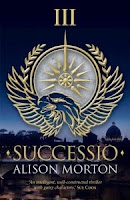My Tuesday Talk guest
today, Alison Morton, has just published AURELIA,
the fourth book in her Roma Nova
the fourth book in her Roma Nova
alternative history thriller series (more below).
Her characters live in a
modern imaginary Roman country, but for her research she often looks back to
the Ancient Roman world...
over to Alison who will tell us more:
Money-making
booksellers, exploited and impoverished authors, celebrity book launches and
the danger of writing controversially. Sound familiar?
Even
without the current technology of print-on-demand, digital publishing, even the
lithographic or moveable type of not so long ago, the Roman world had a
thriving publishing industry. Production was by teams of slaves who copied
original manuscripts which were then sold in shops. Copyright didn't exist, so
publishers didn't have to pay authors for their work.
The
only way writers could make a good living out of their work was to be sponsored
by a wealthy Roman, i.e. to become the 'client' of an influential
'patron'. The writer could produce his own work, but he was under a
strong obligation to write what the patron wanted. He would also be trotted out
to give readings of his work to the patron's friends at parties. However, it
was an opportunity for the writer to launch his latest work in front of
other potential patrons, to network and possibly find a new, and better
sponsor.
 |
BM_scroll2.jpg
Seated man reads from a scroll to Thalia, the Muse of comedy
AD 180-200 © Trustees of the British Museum
|
However,
woe betide (thrice woe!) if the author wrote something that displeased his
patron. Apart from losing his livelihood, an author could face serious
penalties. Books were seen as dangerous because they spread ideas. Political
control of the media was exercised very firmly in ancient Rome; the punishment
for writing something libellous was death.
 |
BM_scroll1.jpg
Gravestone of Avita, who is reading from a scroll; second scroll on a reading-stand. © Trustees of the British Museum |
As
the writer Juvenal pointed out, the best thing to do was to wait until someone
died before you criticised them. Historians were considered to be particularly dangerous.Emperor Domitian disapproved of books written by the historian Hermogenes of Tarsus and had him executed. As well as ordering the destruction of all the books written by Hermogenes, Domitian also had all the slaves killed who had done the copying.
The
first books published in Rome took the form of a long roll of papyrus
consisting of about twenty sheets glued together. These volumenes were
both difficult to read and easy to damage, especially if produced on cheap,
poorly produced papyrus. If handled clumsily, the scrolls would crack or
disintegrate, if exposed to the damp the papyrus rotted, and the ink made from
soot, resin and the black liquid from cuttlefish, would begin to fade. Insects liked eating papyrus so books had to be stored in boxes.
In
about AD 365 Romans began to make books of parchment. The sheets were folded
and sewn together and looked much more like modern books. However, parchment
was expensive and as with the papyrus scrolls, few people could afford them.
 |
Ephesus_Celsus_Library.jpg
Photo courtesy of Benh LIEU SONG
under Creative Commons |
Most
major cities in the Roman Empire had public libraries such as the remarkable
one in Ephesus built in honour of the Roman senator, Tiberius Julius Celsus Polemaeanus by his son,
Gaius Julius Aquila. Celsus had been consul in
92 AD, governor of Asia in 115 AD. Influential private citizens,
including G. Julius Caesar, established them as status symbols. By AD 377 Rome
had twenty-eight large libraries where citizens could go and read books free of
charge. However, to maintain tight control over what people read, government
officials censored the books that appeared on the shelves.
For
further reading(!), I thoroughly recommend Mary Beard's article "Scrolling Down the Ages" 16 April 2009
New York Times and Lindsey Davis' Ode to a Banker where her irrepressible
detective Falco fancies himself as a poet, but comes up against things far more
sinister than a poetry reading evening...
 |
Pompeii_bookgirl.jpg
© Alison Morton
|
About the author
Even before she
pulled on her first set of combats, Alison Morton was fascinated by the idea of
women soldiers. Brought up by a feminist mother and an ex-military father, it
never occurred to her that women couldn’t serve their country in the armed
forces. Everybody in her family had done time in uniform and in theatre –
regular and reserve Army, RAF, WRNS, WRAF – all over the globe.
So busy in her
day job, Alison joined the Territorial Army in a special communications
regiment and left as a captain, having done all sorts of interesting and
exciting things no civilian would ever know or see. Or that she can talk about,
even now…
But something
else fuels her writing… Fascinated by the mosaics at Ampurias (Spain), at their
creation by the complex, power and value-driven Roman civilisation started her
wondering what a modern Roman society would be like if run by strong women…
Now, she lives in
France and writes Roman-themed alternate history thrillers with tough heroines:
INCEPTIO, the
first in the Roma Nova series
– shortlisted for
the 2013 International Rubery Book Award
– B.R.A.G.
Medallion
– finalist in
2014 Writing Magazine Self-Published Book of the Year
PERFIDITAS, second
in series
– B.R.A.G.
Medallion
– finalist in
2014 Writing Magazine Self-Published Book of the Year
SUCCESSIO, third in
series
– Historical
Novel Society’s indie Editor’s Choice for Autumn 2014
– B.R.A.G.
Medallion
– Editor’s
choice, The Bookseller’s inaugural Indie Preview, December 2014
About AURELIA, the first of
a new three book cycle in the Roma Nova series
But her country needs her unique skills.
Somebody is smuggling silver – Roma Nova’s lifeblood – on an industrial scale.
Sent to Berlin to investigate, she encounters the mysterious and attractive
Miklós, a known smuggler who knows too much and Caius Tellus, a Roma Novan she
has despised and feared since childhood.
Barely escaping a trap set by a gang boss
intent on terminating her, she discovers that her old enemy is at the heart of
all her troubles and pursues him back home to Roma Nova...
Warning: there is
exciting music!
AURELIA is available
from Amazon and other ebook
retailers or as a paperback from Amazon or through any bookshop. (All direct
links here)
Find out
more about Alison and Roma Nova here: http://alison-morton.com
Facebook author page: https://www.facebook.com/AlisonMortonAuthor
Twitter: https://twitter.com/alison_morton @alison-morton
If you have read a book and enjoyed it
please leave a comment on Amazon (UK, US & Canada etc)
Four or five star comments can help an author
by boosting the Amazon Ranking List
Thank you







Alison, I enjoyed reading your post about books and their beginnings and also watching your book trailers. Well done. I'm just now worrying myself over trailers for my Loyalist series. Great post!
ReplyDeleteThank you for your comment Elaine - my apologies for the late reply I've been away from the computer. I can recommend www.avalongraphics.org for trailers, although I think Cathy Helms is fairly booked up at the moment. (she does all mine - see Book Trailers on the menu bar above)
DeleteThanks, Elaine, I'm delighted you enjoyed it. Sometimes the non-battle and non-conquering side of Roman life is more fascinating than all the 'tough stuff' we generally associate with ancient Rome.
ReplyDeleteI confess to being a bit of a geek, so I made the book trailers myself using iMovie. The key things are to define what effect you want (tense, soft, thrilling,romantic, etc.) work out the story board (images, words), choose music and hunt down pictures/movie clips. I think about the content a lot beforehand, but keep the production side *really* simple,